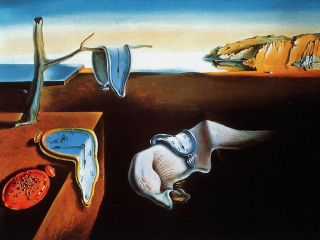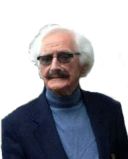Environment
Consciousness and the Illusive Nature of Time
Why does time sometimes seem to fly? And sometimes to stand still?
Posted August 9, 2012

Salvador Dali's "The Persistence of Memory"
I remember the Sunday—I was about ten or eleven years old—when I refused to go to the Children’s Service at the local Parish Church if a certain hymn was to be sung. For its verses seemed to celebrate nothing but ‘gloom and doom’. One verse was particularly depressing. It went: Time like an ever-rolling stream/ Bears all its sons away/ They fly forgotten as a dream/ Dies at the opening day.
Even at that early age I didn’t need to be reminded about the brevity of our existence. I had been aware of life’s grim timetable—the obvious uncertainty of survival for any of us—ever since my dog died when I was about seven. Una’s death left a void in my life. For several months Time played tricks: the normal ongoingmarch of the clock became seriously disrupted: sometimes ten minutes would seem like an hour…. And a day could pass without me being particularly aware of its beginning or its end.
Such was my first encounter with the fluid nature of Time, and as the months passed I came to realize that Time as not like an ‘ever-rolling’ stream, but more like an ‘ever-cascading’ one: a series of large and small waterfalls interrupted by flowing stretches of water… where pools could cause the current to either slow or speed-up. Ultimately, one comes to be fully aware that the passage of Time in life is both inconstant and unpredictable. Which inevitably raises the interesting question concerning the relationship between human consciousness and Time.
Simply put, consciousness recognizes Time as a linear and durational phenomenon. It brings an awareness of the sequence of ‘happenings’ in the outside world in terms of the concepts ‘past’, ‘present’ and ‘future’… and thinks of the length of interval between them as ‘Time’. However, consciousness does not simply note and record Time in this way. It modifies the duration of Time according to the psychological disposition one brings to the situation: the personal meaning and significance an event engenders, and the degree and the nature of feeling aroused, can completely change one’s perception of Time.
Let me give you another personal example of how this works. During the Second World War when serving in the Royal Air Force, there were occasions when evening telephone calls from or to the airfield were not permitted on operational nights. It was not possible to know in advance when calls were going to banned, and so I had a standing arrangement with my girlfriend in the north of England that on Thursday nights at 6 p.m. she would call the number of the public telephone kiosk in the village 2 miles from the Base. Fifteen minutes fast pedaling on my bicycle and I would be in the kiosk, taking possession, at 5:55 p.m. to begin the long wait—all of five minutes.
But no call came through. Wondering what could have gone wrong, I would check my wristwatch. Only one minute had gone by. Surely the watch must have stopped? But the ‘seconds hand’ was still ticking away. So I would stare out into the village street, resisting the urge to check the time. No call. Something really must have happened. Check the wristwatch again. Couldn’t believe it. Still two minutes to go! Finally, after what seemed like eons of time, the telephone phone rang. And as we began to talk, Time stopped. But at that point during the war, long-distance calls were limited to four minutes. A whole four minutes…. And they were over in a flash…
So I came to learn that so far as our human consciousness is concerned, the duration of Time—its rate of ‘flow’—is not constant: It can be slowed down and extended during the interval when one is waiting, anxious and uncertain, for events to occur. Or it may speed up and become compressed, its duration seemingly shortened when an intensely significant important event actually happens. So it could be said that human consciousness recognizes—or even creates—two levels of Time: Time in Duration and Time in Intensity.
Could Time then be a construct of our own consciousness? Physicists looking for the Higgs Boson using the large Hadron Collider at Cern, Geneva, would seem to have found that the linear flow of Time from the past to the present to the future—the mental construct we have lived with for centuries—is challenged: inasmuch as the ‘collision’ of fundamental particles results in particle and energy ‘happenings’ occurring simultaneously—no apparent intervals between them. This lends credence to the suggestion made by some respectable physicists that what we call Time is an illusion, a side effect of the way our minds work—that it does not apply to cosmological events. The London Sunday Times reported last week that…’ Time remains an embarrassing elephant in the room for physics.’


